
Very Late English Apples
I have a fascination with late apples. By late, I don't mean October or November. A
late apple is one which you pick off the tree, juicy and fresh, on Christmas morning or New
Year's Day.
There are three main types of apple, as growers know. Earlies are
ready in late August or September, Mids in early October, and lates in early November. But the "very
lates" are almost a fourth type.
Firstly, their flesh is very dense. Secondly, they often have shiny skins which are very
impermeable so they're not damaged much by rain or frost. Thirdly, they have an intense flavour, often fairly
tart until they're ready. Lastly, they don't bruise easily.
There are a few varieties available commercially which behave like this. Allen's Everlasting comes to
mind, and this would be a "phase three" apple as defined by Barrie Juniper. But I've been looking in the
hedgerows of the Midlands for about a decade and have been astonished
by what is around, growing wild, often along ancient roads.
What follows below is unique to this site. You won't find information about the following apples anywhere else.
They are not in the National Fruit Collection, or, so far as I know, in any fruit collection. The apples were
all picked and photographed on 1 Jan 2007.
Whitwick Pippin is remarkable. On Jan 1st it my apples were almost ripe; crisp, dense, flavoursome, and of
beautiful appearance. It's a "middle" vitamin C variety; quite acidic but not unpleasantly so. This apple can
hang until March, (by which time there may be some frost damage) but reaches its peak most years in early January. I've no idea of its keeping
quality since I use it straight off the tree. I propogate a few of these for friends so I hope it will
find its way into the National Fruit Collection one day.
Here's a photo:
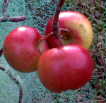
Over New Year we stayed with relatives in Witney. On our way back on New year's Day to Leicestershire we went the back way to Burford, and
picked up some scion wood from two trees, which I've named "Burford Red" and "Burford Yellow". These are
eating apples. We stopped the car to take some pictures.
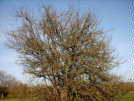

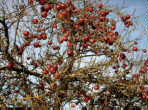
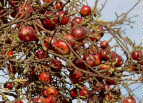

Also near Burford we stopped to pick up scion wood from another tree we'd noticed a year earlier: "Burford Sour".
This is a rich-flavoured yellow cooking apple, which drops off the tree in mid-December. There were a few on the
ground:

This apple was grafted successfully in 2006.
Twenty miles further on we noticed another interesting-looking apple tree in a hedgerow, so stopped the car for
yet more scion wood and some fruit samples. Here are three of the apples:

On reaching High Cross, where the Watling Street crosses the Fosse Way, we found another tree:

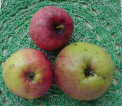
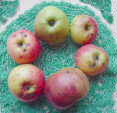
If somedone told you they'd find five interesting apples growing wild on an 80-mile trip on New year's Day
in England, you probably wouldn't believe them.
Barrie Juniper has done fascinating work on collecting apples in Kazakhstan, but you don't need to travel
thousands of miles to find new varieties.
It's also likely that the seedlings I found on my journey have their origins in Kazakhstan, but that's another
story.
copyright Nigel Deacon / Diversity website